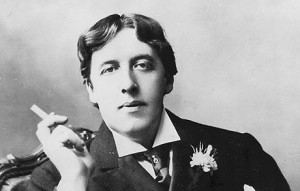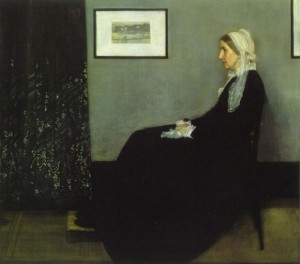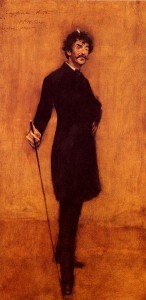Speaking of his friend, the painter James Abbott McNeil Whistler, Oscar Wilde once said,
“Mr. Whistler always spelt art, and I believe still spells it, with a capital ‘I,'”
a legendary put-down applicable to far too many artists, writers, and other creative types.
Wilde, the author of The Importance of Being Earnest, and The Picture of Dorian Gray, was one of the great wits of his age. His target was one of the first American modern artists, best known today for a portrait called by most “Whistler’s Mother,” seen less often in art books and more in sentimental greeting cards and even a postage stamp. This, rather than the above quote, would have horrified Whistler, who intended the painting to be a dispassionate revolutionary statement of art for art’s sake. He had titled it Arrangement in Grey and Black No. 1.
Wilde and Whistler, notorious dandies in mid-19th century London, often traded bon-mots. Whistler, who was twenty years older, was already a celebrated wit by the time he first met Wilde. (When asked why he had been born in Lowell, Massachusetts, Whistler replied that he wanted to be close to his mother.) Both could legitimately compete for the titles of preeminent wit and vainest man of their era (Whistler sometimes referred to himself as “the amazing one”). In time there was friction. Whistler began to feel that his young friend (whose reputation was eclipsing his) had borrowed his flamboyant and eccentric style of dress and speaking. It is reported after a particularly good witticism by Whistler at a party Wilde once said to him, “I wish I had said that.” Whistler answered, “You will, Oscar, you will.” In a battle of telegrams, Wilde wrote with pleasure, “When you and I are together we never talk about anything except ourselves.” Whistler responded, “No, no, Oscar, you forget. When you and I are together, we never talk about anything except me.”
Despite their back and forth repartee and ultimate falling out, Wilde retained great respect and affection for his friend and mentor. His sharp put-down at the top of this entry finishes with a testimonial to Whistler,
However, he was never dull. His brilliant wit, his caustic satire, and his amusing epigrams, or perhaps we should say epitaphs on his contemporaries made his views on art as delightful as they were misleading, and as fascinating as they were unsound. Besides, he introduced humour into art criticism, and for this if no other reason he deserves to be affectionately remembered.



